Grapeseed Oil vs Olive Oil: Which is Better? Let’s Compare
Informing people about healthy foods is part of my Health Coaching objectives. Many of my clients ask about healthy oils like olive oil and grapeseed oil. The most common question they ask is, is grapeseed oil vs olive oil, which is better?
Olive oil is better than grapeseed oil due to its higher percentage of minerals and vitamins. Olive oil contains 692% more heart healthy omega-3 fatty acids than grapeseed oil. Olive oil contains some nutrients olive oil doesn’t like vitamin K, potassium, iron and calcium.
This article will include a complete comparison of both oils including their nutrients side-by-side. In addition, I’ll examine their tastes, whether one can substitute for the other, prices, smoke points and health benefits. I’ll take a close look at which one is better for the most common goals.
In addition to coaching clients about them, I’ve purchased, researched and consumed both oils prior to, during and sometimes after writing this article.
Grapeseed Oil vs Olive Oil: The Differences
Olive oil is made by extracting the oil from olives using heat and/or chemicals. Grapeseed oil is made by extracting the oil from grape seeds leftover from grapes used for wine making. The finished olive oil is a blend of refined olive oil and extra virgin.
Grapeseed Oil
- Made from pressed grape seeds leftover from grapes used for wine making.
- Has a mild, slightly grassy and fruity flavor.
- Cost less money.
- Has a slightly lower smoke point.
- Typically lighter in color with a hint of yellow to green.
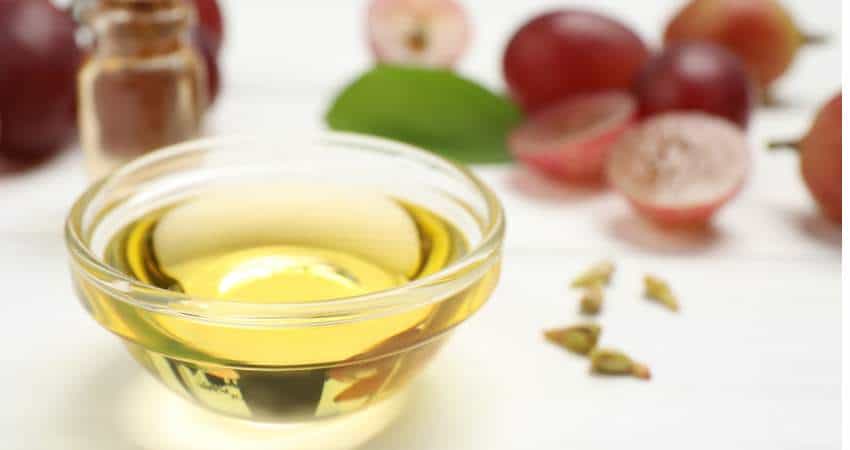
It is made by the following method:
- The grape seeds are washed to remove unwanted products.
- The seeds are then dried to remove excess water.
- The grape seeds are then crushed or pressed to remove the oil from the seed.
- It is filtered to remove some of the seed remaining.
- It is filtered a second time to make sure all the oil cakes are removed.
- It is then bottled for shipping and sale to the market.
Olive Oil and Extra Virgin
- Made from olives using heat and chemicals.
- Has a mild, peppery flavor.
- Cost more money.
- Has a higher smoke point.
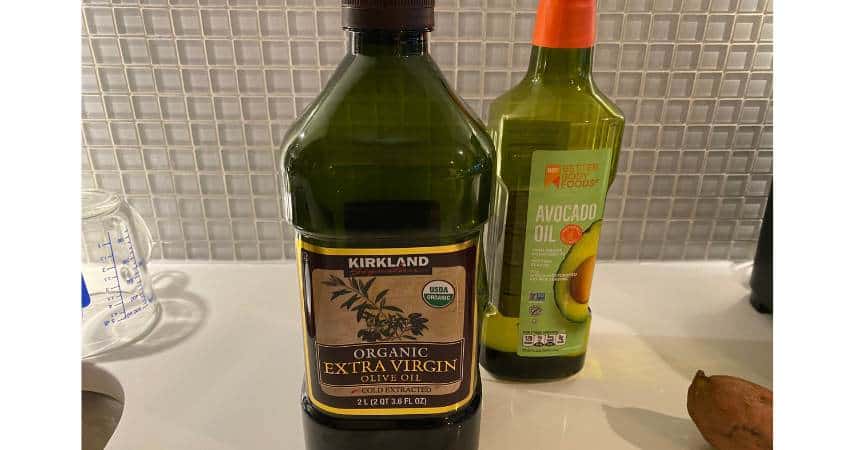
It is made by the following method:
- It is made by using the leftover paste from making extra virgin olive oil.
- The leftover paste is heated and kneaded with chemicals to release more oil, water and residue from the paste.
- It is separated from the water and residue.
- It’s filtered and bottled.
All varieties are held to certain USDA grade standards ((USDA: Grades of Olive Oil)). Extra virgin olive oil is certified as having the highest grade standards for excellent flavor, odor and free fatty acid content. It must not exceed 0.8 grams of oleic acid per 100 grams.
Nutrient Comparison
The following table compares the nutrients contained in one tablespoon of each one:
| Olive Oil (1 Tbsp/13.5 grams) | Grapeseed Oil (1 Tbsp/13.5 grams) | |
| Calories | 119 | 119 |
| Protein | 0 g | 0 g |
| Carbohydrates | 0 g | 0 g |
| Fiber | 0 g | 0 g |
| Fat | 13.5 g | 13.5 g |
| Sugar | 0 g | 0 g |
| Sodium | 0.27 mg | 0 g |
| Vitamin K | 8.13 mcg | 0 mcg |
| Vitamin E | 1.94 mg | 3.89 mg |
| Potassium | 0.135 mg | 0 mg |
| Iron | 0.076 mg | 0 mg |
| Calcium | 0.135 mg | 0 mg |
| Omega-3 | 103 mg | 13 g |
| Omega-6 | 1,318 mg | 9,059 g |
| Saturated Fat | 1.86 g | 1.30 g |
| Monounsaturated Fat | 9.86 g | 2.17 g |
| Polyunsaturated Fat | 1.42 g | 9.44 g |
The nutrients in the table above may differ at times depending on the manufacturer. This may be due to the time of year, grapes used, olives used, when they were pressed and other factors.
At first glance, it looks like they contain a similar set of nutrients. This may make some people wonder which one is healthier.
Olive oil is healthier than grapeseed oil due to its higher percentage of vitamins, minerals and it provides a better quality of fats. It contains more vitamin K, potassium, iron, and calcium. In addition, it contains 354% more heart healthy monounsaturated fats.
Grapeseed oil is healthy also and contains a good number of vitamin E, healthy fats and antioxidants. Although many of the fats are polyunsaturated, mainly omega-6. This makes its omega-3 to omega 6 ratio less than the ideal.
I mostly use olive oils and avocado oil for their taste and nutrients. I use olive for low temperature cooking, salads, dipping and similar uses.
Let’s take a closer look at each macronutrient, vitamin, mineral and fat closer.
Calories
- They both contain 119 calories per one tablespoon.
Vitamin K
- Olive oil contains more vitamin K per one tablespoon.
Vitamin E
- Grapeseed oil contains 100.5% more vitamin E per one tablespoon.
Potassium
- Olive oil contains more potassium per one tablespoon.
Iron
- Olive oil contains more iron per one tablespoon.
Calcium
- Olive oil contains more calcium per one tablespoon.
Saturated Fat
- Olive oil contains 43% more saturated fat per one tablespoon.
Monounsaturated Fat
- Olive oil contains 354% more monounsaturated fat per one tablespoon.
Polyunsaturated Fats
- Grapeseed oil is rich in polyunsaturated fats containing 564% more per one tablespoon. Therefore, grapeseed oil is the clear winner when it comes to polyunsaturated fats.
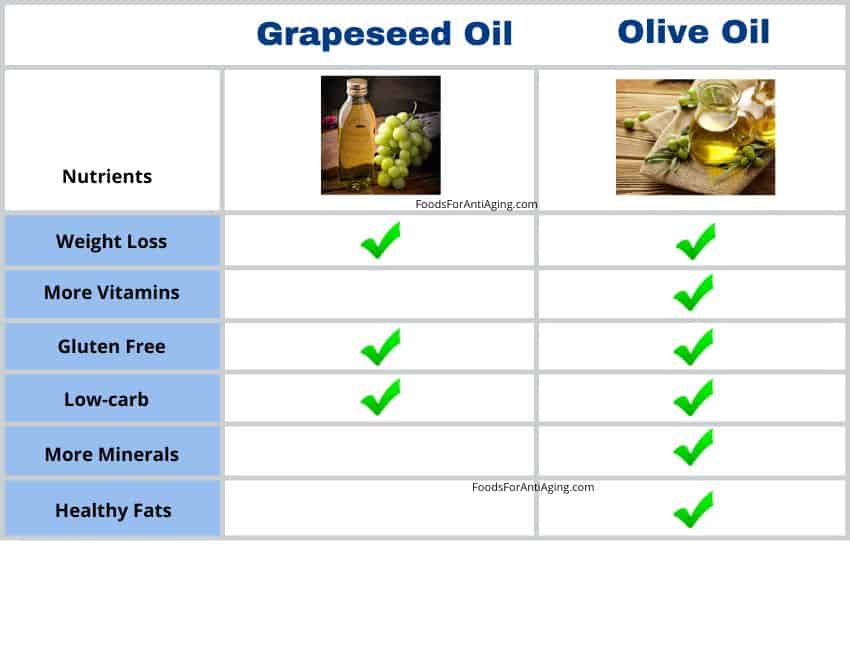
Which to Choose Based on Your Goals
Choosing one cooking oil may depend on your particular goal. Therefore, in this section I examine the most common goals and determine which is the better choice for each one.
Weight Loss
Weight loss is something many people battles with each year. If you’re looking to lose some weight, the number of calories may matter to you.
Therefore, let’s examine which is better for weight loss.
- Olive and grapeseed oil are similar for weight loss because they contain the same number of calories per tablespoon.
Even though both are considered healthy additions to your diet, at 119 calories per tablespoon the calories can add up pretty fast.
It’s easy to add multiple tablespoon into a salad. Four tablespoons equal 476 calories added to the salad. Always be aware of the amount added and try not to overdo it.
Keto or Low Carb Diets
The goal of most low-carb diets is to consume few carbohydrates and add more fat and protein. The numbers can be so limited every carbohydrate can make a difference.
Therefore, let’s examine which one has fewer carbohydrates or more fat.
- Grapeseed oil and olive oil are both beneficial for low-carb diets due to their similar amount of carbohydrates and fats. Both don’t contain any carbohydrates and are a healthy source of fats.
Bodybuilding
If you’re trying to gain lean muscle mass, the amount of protein and carbohydrates may make a difference. Let’s take a look at both and determine which is better for bodybuilding.
Grapeseed oil and olive oil are similar for bodybuilding because neither oil contains protein or carbohydrates. Both of them contain healthy fats and are a good addition to any bodybuilding diet. When bulking up, the calories may prove beneficial.
Gluten Free
Avoiding any gluten is the main goal for people who wish to follow a gluten free diet or have Celiac disease. Therefore, let’s examine which one is gluten free.
- Olive and grapeseed oil are both gluten free and good for gluten free diets.
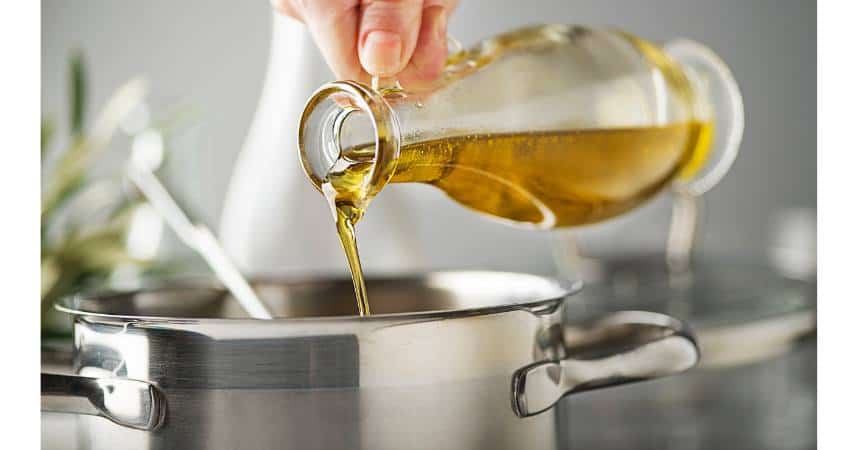
Taste
Sometimes the nutrients and goals take a back seat to how something tastes. After all, if someone doesn’t like how a food tastes, they will probably choose to leave it on the shelf.
Therefore, let’s examine how the taste of both compare.
Olive oil has a slightly stronger flavor than the milder grapeseed oil. Grapeseed oil has a neutral, slightly fruity or grassy taste, while olive oil has a hint of olives and is peppery. The virgin oils of both have more flavor than the refined versions.
I wanted to get the opinion of real people like you by conducting some original research. Therefore, I reached out to some readers, clients and members of food groups. I asked, which one tastes better?
- 60% said they preferred the taste of olive oil.
- 37% said they preferred the taste of grapeseed oil.
- 3% said they had no preference.
To conduct more research, I setup and participated my own blind taste test. I tasted a teaspoon of each and chose the olive for its better taste.
The following video explains which olive oil tastes the best.
Substitutions
Have you ever wanted to try a new recipe the last minute and found out you didn’t have the correct ingredient at home? Unable to go out to the store, you’ve probably wondered if you can use another one in its place.
Availability is one reason people will want to substitute one for the other in a recipe. Other reasons for doing this may include variety, taste, price or smoke point.
This makes people wonder if they can substitute one for the other.
Grapeseed oil and olive oil can be used for each other in cold recipes. In hot recipes when cooking over 421°F, grapeseed oil can’t substitute for olive, but olive oil can substitute for grapeseed. When substituting the flavor will be slightly different in some recipes.
Olive oil substitutes for high temperature cooking include the following:
- Refined avocado oil
- Safflower oil (refined and neutralized)
- Extra virgin avocado oil
- Pecan oil
- Sesame oil
- Corn oil
- Soybean oil
- Peanut oil
- Refined rice bran oil
Grapeseed oil substitutes for high temperature cooking include the following:
- Pecan oil
- Safflower oil refined
- Safflower oil neutralized
- Refined olive oil
- Palm oil
- Soybean oil
- Refined rice bran oil
- Peanut oil
- Avocado oil
- Sesame oil
Smoke Point
The following are the smoke points for each one:
| Type of Oil & Fats | Smoke Point (Fahrenheit) |
| Grapeseed Oil | 421°F |
| Olive Oil – Refined | 470°F |
| Olive Oil – Virgin | 410°F |
| Olive Oil – Extra virgin | 375°F |
Smoke point source ((Wikipedia: Smoke point))
Since grapeseed oil is high in polyunsaturated fat, it shouldn’t be used in high temperature cooking3. These fats react with oxygen at high heat forming free radicals and harmful compounds.
Or for a complete list of the smoke point of all cooking oil, it’s included in my article, A Guide For Frying With Avocado Oil.
The following video compares the benefits of olive or grapeseed.
How to Incorporate Them Into Your Diet
Grapeseed Oil
Some people prefer using it because it doesn’t overpower the other flavors. Using it results in a different flavor and variety.
- Use it when cooking in low to moderate temperatures.
- Dressings
- Add a tablespoon to a smoothie.
- Baking
- Sauteing
- Marinades
- Soups
Olive Oil
- Use it for any cooking in temperatures up to 470 degrees.
- Frying
- Stir-frying
- Grilling
- Baking
- Dipping
- Salads
- Dressings
Check out my article and find out how vegetable oil compares and if it’s as bad as they say.
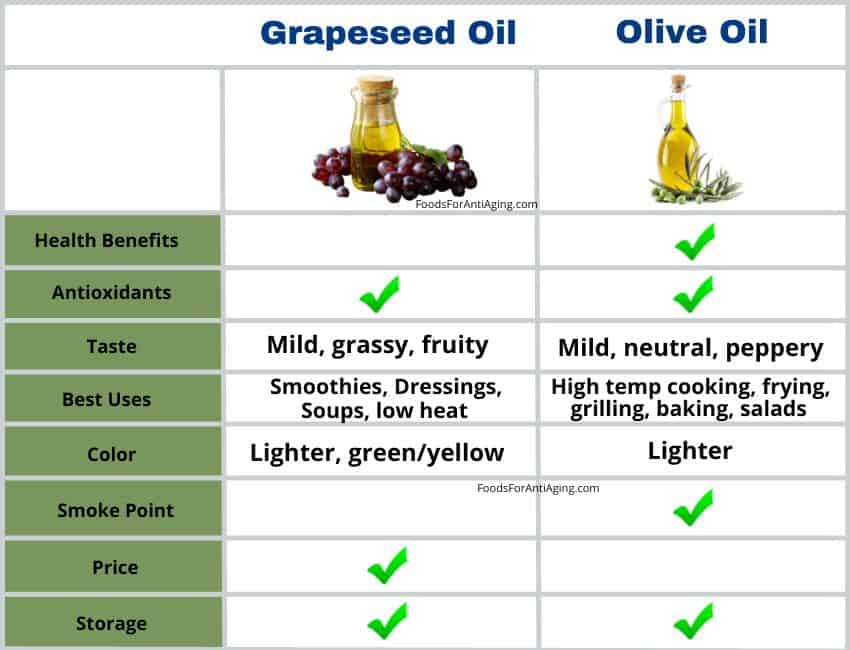
Oil Prices
Every trip to the supermarket seems to get more expensive than the last. For this reason and others, I’m sure the prices of food matters to most people. Therefore, let’s examine the prices.
Olive oil costs 27% more than grapeseed oil per ounce. Grapeseed oil average cost per ounce is $0.29 and the average price for olive oil per ounce is $0.37.
To conduct my own research, I checked three different supermarkets located in my area. All the supermarkets are on different levels of pricing. Walmart is the most economical and Stop and Shop being more expensive.
Here are my findings, I first visited Shoprite:
Walmart:
- Grapeseed oil (Store brand) – 25.5 ounce $4.12 ($0.16 per ounce)
- Olive oil (Store brand) – 17 ounce $2.52 ($0.15 per ounce)
Stop and Shop:
- Grapeseed (Pompeian) – 24 ounce $9.39 ($0.39 per ounce)
- Olive (Pompeian) – 25.4 ounce $11.79 ($0.46 per ounce)
Shoprite
- Grapeseed (Pompeian) – 24 ounce $7.99 ($0.33 per ounce)
- Olive (Pompeian) – 32 ounce $15.79 ($0.49 per ounce)
Find out how sunflower oil compares in my article, could it be better?

How to Store
Good quality food can be costly, therefore, the shelf life you get out of each one is important. In addition, improper storage may lessen the taste and quality. Let’s examine how each one should be stored.
They both can be stored the same way.
Store grapeseed oil or olive oil in a cool, dark location away from light. It’s best to store them in a tinted glass container. Both should be kept at a temperature between 55-60℉, although they can be refrigerated or frozen if needed.
They should be stored in the refrigerator if the room temperature rises above 70℉. Leaving them in warmer temperatures affects shelf life and lessens the quality.
Unrefined or extra virgin can go bad quicker than refined. For this reason many people store them in the refrigerator regardless of the room temperature.
Due to heat-creating appliances and heated ovens, kitchens tend to be a bit warmer than most other rooms of the house. Therefore, be sure to monitor your oil and the temperature of the room.
My kitchen is cool and away from sunlight. Therefore, I store mine in a cabinet away from the stove area.
Find out how sesame oil compared in my article.
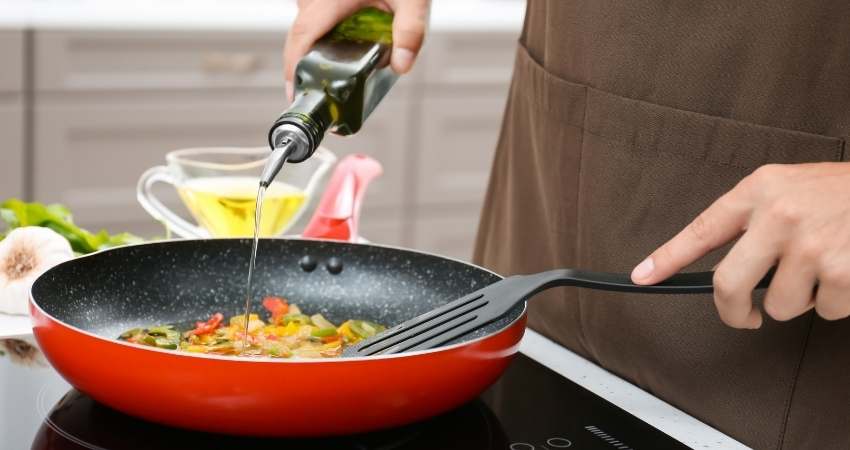
Health Benefits
They both contain a wealth of healthy fats and antioxidants. The fats and antioxidants provide many health benefits which I’ll examine in this section.
Olive Oil Benefits
Heart Disease
Heart disease and stroke are among the most common causes of death throughout the world. Studies have shown heart disease is lower in the Mediterranean countries where olive oil is a big part of their diets.
There are many ways it is beneficial for the heart including the following:
Lowering Blood Pressure
Studies have shown an association between lower blood pressure and an increase in olive oil consumption. The Mediterranean diet has been linked to lower blood pressure and cardiovascular disease4.
Blood Vessel Health
It has been shown to help improve the lining of blood vessels. A study published in 2015 showed blood vessels opened up and increased blood flow in people who included it in their diet5.
Reducing Inflammation
It is associated with decreases in inflammation which is a main component of heart disease. An antioxidant, oleocanthal, is an anti-inflammatory that also reduces pain6.
Cancer
The cancer rates in Mediterranean countries is lower than other places.
Antioxidants are believed to contribute to the killing of cancer cells. In a 2015 study, oleocanthal helped kill cancer cells in less than one hour7.
Another study published in 2015 evaluated the consumption of the Mediterranean diet and the incidence of breast cancer. For a six-year period, 4,282 women aged 60 to 80 years followed three different diets:
- Mediterranean diet supplemented with extra virgin olive oil (EVOO).
- Mediterranean diet supplemented with mixed nuts.
- A reduced fat diet.
After 4.8 years 35 of the women developed breast cancer. The lowest rate of breast cancer was seen in the women who supplemented with the EVOO8.
Oleic acid has been associated with helping to reduce the risk of cancers.
Brain Health
Alzheimer’s disease is the most common form of dementia causing problems with thinking, memory and behavior. A common feature of the disease is the build-up of proteins known as beta-amyloid plaques in certain neurons in the brain.
Animal studies have shown EVOO to clear the beta-amyloid proteins from the brain helping to prevent Alzheimer’s disease9.
Several studies conducted on humans have shown the Mediterranean diet may be associated with a reduced risk of cognitive problems and dementia10.
Find out how avocado oil compares in my article and find out which one is better.
The following video explains some benefits of grapeseed oil.
Grapeseed Oil Health Benefits
Inflammation
A two month study involving 44 overweight women compared the effects of taking grapeseed and sunflower oil. Two groups either consumed either one through a weight loss diet for eight weeks.
The women who consumed the grapeseed oil experienced less inflammation than the women in the sunflower group11.
Blood Clotting
A 2016 study involved 30 healthy people who were given either peanut oil or grapeseed oil. A smaller group received no oils at all. The grapeseed and peanut oil groups both showed a decrease in platelet aggregation12.
A 2014 study acknowledges grapeseed extracts inhibit platelet formation which may prevent blood clots. To find out why this may occur was the purpose of the study. The researchers propose the extracts inhibit platelet aggregation by lowering tyrosine phosphatase activity13.
Heart Disease
Some research has shown replacing saturated fats with polyunsaturated fats may significantly reduce the risk of heart attack and stroke14.
You may want to check out my comparison article with butter, is it really that bad?
If you have any questions about this article don’t hesitate to email us. You can find an email on our contact page.
Read More Olive Oil and Oil Articles
Olive Oil vs Coconut Oil: Which is Better? Let’s Compare
Olive Oil vs Soybean Oil: Which is Better? Let’s Compare
Olive Oil vs Canola Oil: Which is Better? Let’s Compare
Extra Virgin Olive Oil vs Olive Oil: A Complete Comparison
The Complete Guide To Storing Extra Virgin Olive Oil
Can Extra Virgin Olive Oil Go Bad? What You Need To Know
Can I Replace Olive Oil With Coconut Oil?
This is the Best Way to Store Your Olive Oil
- USDA: Oil, olive, salad or cooking [↩]
- USDA: Oil, grapeseed [↩]
- National Center for Biotechnology Information: Oxidative Stability of Selected Edible Oils [↩]
- National Center for Biotechnology Information: Virgin Olive Oil and Hypertension [↩]
- (National Center for Biotechnology Information: Effects of Olive Oil on Markers of Inflammation and Endothelial Function-A Systematic Review and Meta-Analysis [↩]
- National center for Biotechnology Information: Olive Oil-related Anti-inflammatory Effects on Atherosclerosis: Potential Clinical Implications [↩]
- Taylor & Francis Online: (-)-Oleocanthal rapidly and selectively induces cancer cell death via lysosomal membrane permeabilization [↩]
- Jama Internal Medicine: Mediterranean Diet and Invasive Breast Cancer Risk Among Women at High Cardiovascular Risk in the PREDIMED Trial [↩]
- National Center for Biotechnology Information: Extra-Virgin Olive Oil Attenuates Amyloid-β and Tau Pathologies in the Brains of TgSwDI Mice [↩]
- National Center for Biotechnology Information: Mediterranean Diet and Risk of Dementia and Alzheimer’s Disease in the EPIC-Spain Dementia Cohort Study [↩]
- National Center for Biotechnology Information: Does grape seed oil improve inflammation and insulin resistance in overweight or obese women? [↩]
- National Center for Biotechnology Information: Reduction of Platelet Aggregation From Ingestion of Oleic and Linoleic Acids Found in Vitis vinifera and Arachis hypogaea Oils [↩]
- National Center for Biotechnology Information: Grape seed extracts inhibit platelet aggregation by inhibiting protein tyrosine phosphatase [↩]
- National Center for Biotechnology Information: A systematic review of the effect of dietary saturated and polyunsaturated fat on heart disease [↩]
